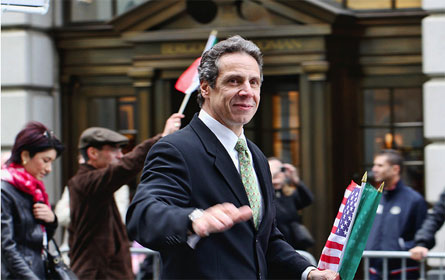
Assemblymember Richard Brodsky walks in from the rain at 485 Kings Highway in Brooklyn. The Democratic candidate for state attorney general is running late, and the clouds and steady showers have made his trip all the more frustrating. Inside, the Sephardic Senior Center presents an entirely different world from the gloom and overcast skies outside. A number of elderly couples trot along a dance floor under bright lights to salsa music; the rest sit at tables chatting, with smiles on their faces.
The DJ changes the song. "Sinatra's 'My Way,'" he announces. And Brodsky, the man who the New York Times described as having a "divisive style" and who is known for his brash manner, waits to be introduced to a room of elderly voters.
When he takes to the microphone at senior centers across Brooklyn, Brodsky chooses to be brief. "Hi! I am Richard Brodsky. I am a fantastic person and a great politician. I am running for attorney general," he declares.

He gets a few laughs. "He’s full of himself. I like that," says an older man to the rest of his table. "You need a politician who isn't afraid to ruffle some feathers."
Who is Paying Attention?
Few of the seniors seem to know much about Brodsky's long record as a member of the State Assembly from Westchester County -- or care, for that matter. And that attitude has characterized much of this year's contest for state attorney general.
A Quinnipiac Poll from last month found that 81 percent of registered Democrats are undecided about who they will vote for in the primary. Voters have five choices: Brodsky, Sen. Eric Schneiderman, Nassau County District Attorney Kathleen Rice, former state Insurance Superintendent Eric Dinallo and lawyer Sean Coffey.
The post is one of three key statewide offices. It launched Eliot Spitzer to the governor's mansion, and the current occupant --Andrew Cuomo -- hopes it will do the same for him. The attorney general serves as the state government's lawyer and has more than 2,000 employees. Despite that -- and even though pundits and reporters are enthralled by the race -- the general public seems uninterested in the current contest.
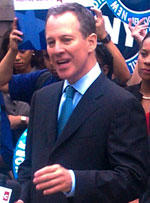
Many following the campaign think that, in the last few weeks the race has shifted. Schneiderman picked up the endorsement of the New York Times, Rev. Al Sharpton, the Amsterdam News, El Diario, The Nation, U.S. Rep. Carolyn Maloney and a slew of other city based politicians and unions -- drastically changing the perception that Rice has the primary locked up.
Perception, though, is all it is. A number of candidates and political observers think the race is wide open. They say there is a gigantic disconnect between the political and pundit classes' view of the race and the way the average primary voter sees it.
"You can’t assume they know who you are," said Brodsky. They don’t care about who stood where when on Rockefeller reform and the spats between Schneiderman and Rice."
For a politician, Brodsky said, this can be bit humbling. "They don’t know that I'm the Yankee stadium guy," he says, referring to his crusade against the use of taxpayer money to build the new stadium.
Each candidate has sought desperately to try to carve out an identity that will let him or her emerge from the pack. Schneiderman, for example, has styled himself as the most progressive of the candidates, while Rice touts her experience as a prosecutor. Brodsky presents himself as an experienced political reformer but lately has sought to capitalize on being the one candidate opposed to the building of the Islamic center near ground zero. Dinallo says his experience in the office under Spitzer and his time as insurance superintendent make him "uniquely qualified" for the job. Coffey who has never held political office, touts his outsider credentials and experience in the military.
The differences, though, can be subtle. At a July 21 debate hosted by the Citizens Union and attended by all five candidates, it was hard to distinguish exactly how the candidates differed on policy. They all said they would support changes to campaign finance laws but refused to take a pledge to place limits on contributions on their own campaign. They talked about fighting corruption in Albany -- essentially using the same talking points -- differing a bit on the techniques they would use to do that.
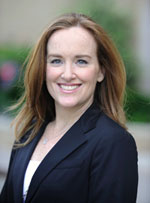
The only standout issue came up when Rice refused to take a pledge other candidates had made not to seek higher office in the next eight years. She has since claimed she was only rejecting the pledge itself and does not have her "sights set" on any other office.
Schneiderman Leans Left
On Monday, Aug. 23, in Albany, fresh off his endorsement by the New York Times, Schneiderman sits at a table with Albany Common Councilmember Barbara Smith and gang expert Yusuf Burgess. The topic is how to prevent gun violence. Schneiderman has just attended a funeral in Buffalo, the result of a shooting at a restaurant that left four people dead and eight wounded. Schneiderman says he has seen the effects of gun violence in cities across the state and touted his stance against illegal guns.
He addresses questions about how he would curb gun violence by stressing his "smart on crime" policies. "We know what works," he said. "We have to invest in it."
These approaches include treatment centers as alternative to prisons. He says the state knows which programs work but doesn’t direct money specifically to those programs.
"You can’t have a government that operates on the basis of we know things work and we don't invest in them, we know things that don't work and yet we spend money on them. So I don't think this is going to cost money," he says. "I think it's more about a re-orientation of our reactors in government and also a re-orientation of the public. We have to just get everyone clear on what works in terms of criminal justice policy."
Schneiderman says that as attorney general he would push for the microstamping of serial numbers on bullets. He sponsored a bill to accomplish this but it failed in the Senate this year. He also said he would work to reform the public defender system.
The Albany discussion represented a turning point: Schneiderman for the first time in the race used his bona fides as a left-leaning, Manhattan liberal.
Schneiderman has differentiated himself from the pack with his talk about social justice, and a few days after his stop in Albany, he pledged during Sharpton's endorsement on the steps of City Hall that Sharpton's brand of justice would have an "annex" in Albany if he is elected.
Observers say Schneiderman is looking to raise as many votes from the city as possible. But that strategy, if it is one, has earned him the scorn of other Democrats. Both Brodsky and Dinallo have wondered if Schneiderman's running so far to the left could hurt Democrats in the fall if Schneiderman wins the primary. They worry that the Republican candidate, Staten Island District Attorney Daniel Donovan, could paint Schneiderman as soft on crime. A number of critics already call Schneiderman’s main achievement as a senator -- overhauling the Rockefeller Drug Law -- "the Drug Dealers' Protection Act."
Rice already has contrasted herself with Schniederman , touting her own record as being a tough-on-crime prosecutor. Rice has earned a reputation as being extremely tough on drunk driving and other vehicular crimes and has earned a reputation nationally for her work. For his part, Schneiderman spent the early months of his campaign painting Rice as a conservative outsider.
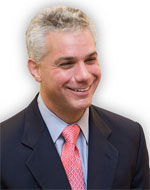
Both Dinallo and Coffey trumpet their ability to be independent Albany watchdogs. Dinallo worked with Spitzer on policing Wall Street and helped apply the Martin Act, a law that allowed Spitzer and his office unparalleled power to police Wall Street, to cases of financial fraud. He said he would like to use similar laws to go after political corruption.
Coffey was a lawyer who represented plaintiffs against World Com for financial fraud and has a record of donating to Democratic candidates. He says he would like to see the legislature pass measures similar to the broad scope of the Martin Act to apply to the attorney general's ability to police corruption in Albany.
Almost a week after Brodsky's tour of senior centers in Brooklyn, Brodsky, Coffey and Dinallo sit down to debate each other in Rochester. Upstaters say they are a bit insulted by Rice and Schneiderman’s absence. Rice and Schneiderman cite previous commitments to explain their absence; Rice was in Queens talking to senior citizens. Schneiderman’s spokesman attribute "scheduling issues" to his absence but will not say where Schneiderman is.
Using Debates to Differentiate
The next day four candidates show up to debate in Albany. Schneiderman again is a no-show.
Brodsky begins to challenge his opponents during a discussion of hydrofracking.
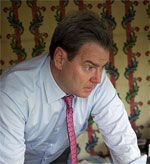
Dinallo and Coffey say they support a moratorium on hydrofracking, a method of drilling for natural gas, but Brodsky says that isn't enough. "We need to make our opinions known now, during the campaign, because if the [Department of Environmental Conservation] makes a recommendation and we are in office, we will have to legally defend it," he said.
The candidates are asked how they would deal with illegal guns. All four say they are in favor of going after illegal guns, and a number of them support microstamping.
Dinallo says he would use the attorney general’s organized crime unit to investigate how illegal guns are distributed. Coffey cites his support for the Brady Campaign to Prevent Gun Violence, but notes he is a good shot, thanks to his days in the Navy.
Brodsky says he thinks the others have misunderstood the question. He says that gun use needs to be approached with "nuance. ... We have to be nuanced enough to understand the great complexity of the state to make sure policies we put out don’t endanger legitimate use of firearms, and that distinction needs to be made.” While Albany is upstate, the city itself does have a gun violence problem and at a debate hosted by a liberal public radio station Brodsky’s answer struck some as odd.
Rice says she thought the question was on illegal firearms and that it was Brodsky who may have misunderstood the question. She says she agrees with Dinallo that the attorney general should attack gun trafficking through the organized crime task force. "I've supported very actively microstamping. It did not get passed in the Senate." Rice says it would have been nice to ask Schneiderman about why the legislation didn’t pass "if he were here today." She goes on to note her work against illegal guns as Nassau County district attorney.
An 800-Pound Gorilla?
Despite all the progressive ideas tossed around by the candidates --taking on Albany corruption, redistricting, policing Wall Street, social justice -- one issue emerges again and again: the proposed Islamic center near Ground Zero.
On Brodsky's day in Brooklyn, the only question he was repeatedly asked was whether he would support a mosque being built two blocks from the World Trade Center site . He told the seniors that he spoke out months ago about his distaste for the center’s planned location. "The mosque being built in that area is offensive to me," he said then. Brodsky says he would defend the mosque's right to be in the area but thinks there is a "sensitivity issue."
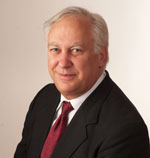
The Islamic center also is a big issue hundreds of miles away in Rochester, judging from questions at the debate. All three candidates on hand said they would investigate the sources of funding for the mosque -- if there is anything to investigate -- but, as he has in the past, Brodsky emphatically voiced his displeasure at the mosque site. "The social fabric is being torn by this," he said.
In Albany the next day the candidates again were asked whether they would investigate funding for the mosque. Coffey said if evidence is presented of wrongdoing he would investigate. Brodsky says that the issue is not as "sterile" as other candidates are making it out to be, and that emotions do need to be taken into account. "Mayor Bloomberg may be right in his views," he said, "but the families’ of the victims feelings are also legitimate. If you are for building the mosque, you are not a terrorist; if you are against it you are not a bigot."
Dinallo strongly disagreed on one of Brodsky’s points. "I do believe the issue does need to be sterile," he said. "The power of subpoena is the highest power in the constitutional system -- one that needs to be used very carefully." Rice said simply she would investigate if presented with evidence.
After the debate, Dinallo said the attorney general needs "poise." He explained, "The mosque is just a latest in a series of issues that distract from the role of the AG: Rockefeller drug laws, the tax cap. Some questioners, reporters and candidates bring up these issues that appeal to voters but are not substantive and distract from the role of the attorney general.”
Where the Votes Are
While emotions run high about the Islamic, at campaign stops throughout the state it appears that most voters are not paying as much attention to what Dinallo would consider the substantive issues or indeed, to the attorney general race. While every candidate has a base to rally, it is not clear which voters they are actually picking up or how they can successfully win new supporters.
Schniederman is banking on support from the city and from black and Latino voters. Rice maintains strong support in Nassau County, and Dinallo and Coffey continue to have strong support upstate. Brodsky has Westchester and expects he is making inroads upstate and in the five boroughs. Dinallo won the endorsement of both the New York Daily News and Crain's, while the New York Post has backed Coffey.
The questions the candidates get from voters are more suited to a candidate for governor -- broad questions about legislative issues. The function of the attorney general seems poorly understood. Is the attorney general a prosecutor, a Wall Street hawk? Does he or she set fiscal policy? Can any attorney general police Albany? Despite all the talk of disgust with the politicians who run the state, the mosque debate seems more prominent in voters' minds than how to reform Albany.
Back in Brooklyn, Brodsky drives himself, seat belt unbuckled, to the next senior center and summarizes his view of the campaign. "If the race is low turnout, which I expect it to be, it will be who can get their supporters to the polls." (A number of other candidates also expect a low turnout.)
Then he gets on his cell phone and starts making calls to Staten Island to figure out whether any reporters will attend his press conference.
The voice on the other end of the line seems uninterested; someone puts him on hold. He covers the mouthpiece with his hand. "See," he says, "the Staten Island paper doesn’t even know who I am. What does that tell you about the race?"